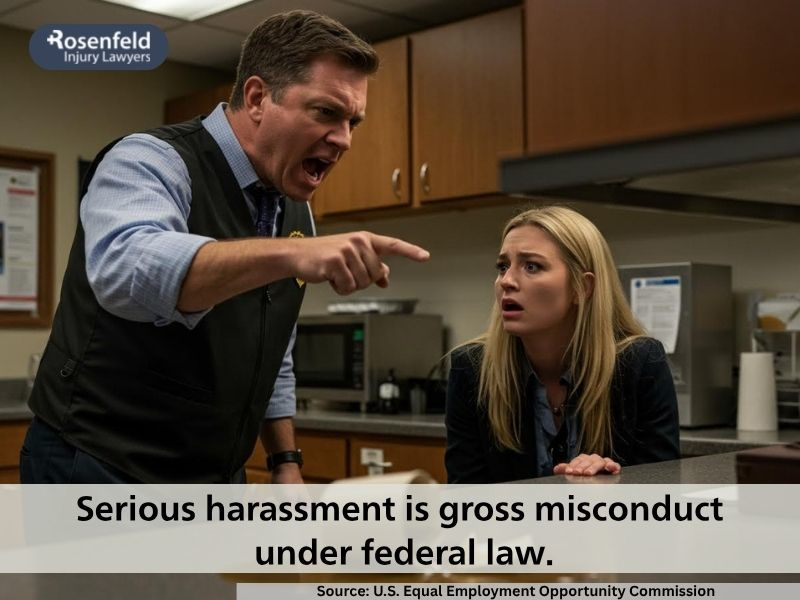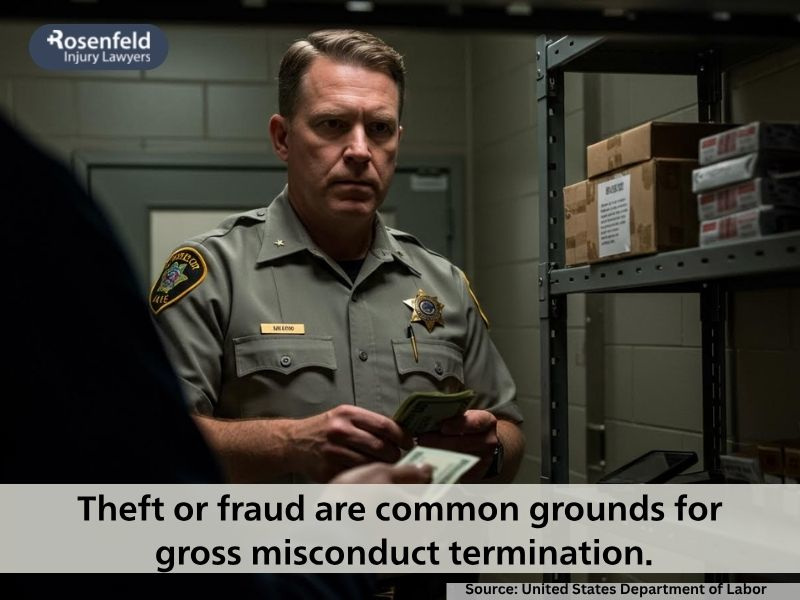What Is Considered Gross Misconduct?
Everyone has a certain level of responsibility to avoid putting others in danger. If your behavior results in someone else getting hurt, there could be legal and financial consequences. One legal term that is often used in civil claims is “gross misconduct.” A behavior may be considered gross misconduct if it is so serious that it represents a deliberate or reckless violation of basic duties, ethics, or laws.
This definition is often applied to employees, professionals, and employers. For example, hospitals, nursing homes, and schools could be guilty of gross misconduct if people are injured, abused, or neglected.
At Injury Lawyer Team, we have decades of experience supporting those who have suffered due to gross misconduct.

What Are Examples of Gross Misconduct?
For a civil case, it is important to understand what constitutes gross misconduct, as well as what differentiates it from ordinary negligence.
Negligence often involves someone overlooking a hazard or making a mistake, whereas gross misconduct involves intentional wrongdoing or extreme disregard for others’ safety. The exact definition may vary from state to state, but it always involves serious ethical or legal violations.
Let’s look at a few examples of such behavior in various settings.
Healthcare and Nursing Homes
- Physically or sexually abusing patients or residents
- Performing unauthorized medical procedures
- Concealing injuries or falsifying patient records
Schools and Childcare Settings
- Teachers engaging in sexual misconduct with students
- Administrators covering up abuse or harassment complaints
- Financial mismanagement or misuse of school funds
Workplaces
- Workplace harassment, discrimination, or retaliation
- Theft, fraud, or intentional data breaches
- Reckless safety violations leading to injury or death
Public and Institutional Contexts
- Law enforcement or corrections officers abusing authority
- Supervisors are ignoring reports of misconduct
- Corruption or obstruction of investigations
What Are the Legal Consequences of Gross Misconduct?
If an employer or employee engages in gross misconduct, the consequences can be severe. For example, sexual harassment or abuse can lead to a criminal conviction, civil damages, and a revoked license for the perpetrator.
Let’s examine some of the consequences of gross misconduct.
Gross Misconduct Termination
There is a big difference between being fired and being terminated for gross misconduct. The latter involves an immediate termination of the employee without notice, severance, or benefits due.
Here is the process a reasonable employer may follow in this type of decision:
- Internal investigation of the incident
- Suspension of pay
- Disciplinary hearing or employment tribunal
- Termination decision
- License suspension or revocation for teachers, doctors, or nurses
- Mandatory reporting to state or federal authorities, depending on the offense
Even for a first offense, an employee could face these consequences if the misconduct was serious enough. For example, a doctor could be dismissed for abusing a patient under the guise of medical care. If an employee commits violence or harassment against a colleague, they could also be terminated in this way.
Disciplinary Action
An individual or institution may be disciplined to address the misconduct before or after a termination or closure. The type of disciplinary action will depend on the severity of the offense.
Some examples of gross misconduct disciplinary actions include:
- A written warning or probation
- A suspension pending investigation
- Mandatory reporting to licensing boards
- A permanent termination or loss of credentials
State and federal laws require employers to investigate allegations fairly and share their findings. In some industries, such as healthcare and education, disciplinary records are shared across state lines. Organizations that facilitate this process are the NASDTEC for teachers and the NPDB for medical professionals.
Civil Liability
If an employee’s misconduct results in an injury or personal harm to someone else, civil liability may be involved. In a civil lawsuit, the victim can pursue fair compensation for legal damages caused by the at-fault party’s behavior. The victim could be an employee, customer, patient, visitor, or passerby.
While the personal injury claim may be directed at the employee who engaged in misconduct, an employer can be held accountable through vicarious liability for ignoring or enabling the conduct.
Criminal Charges
More serious offenses, such as fraud, theft, or assault, could lead to an arrest and criminal prosecution. This legal process is designed to determine if a person is guilty of a crime and deserving of punishment. Criminal charges are separate from civil claims, so a victim could pursue both options against the at-fault employee or business.
If a case involves sexual abuse or misconduct, the perpetrator could face imprisonment and registration as a sex offender.
What Damages Can Victims Recover for Gross Misconduct?
A person’s financial resources may be drastically affected after suffering serious personal harm. As a result, a fair settlement can cover some of these losses. These settlements often involve the perpetrator and the employer or company behind them.
Here are some common types of legal damages that can justify a personal injury lawsuit.
Economic Damages
- Lost wages
- Medical bills (emergency care, surgery, medication, rehabilitation, and physical therapy)
- Future medical expenses
- Diminished earning capacity
Non-Economic Damages
- Emotional distress (PTSD, anxiety, depression, and self-harm)
- Pain and suffering
- Disability and disfigurement
- Loss of enjoyment of life
Punitive Damages
In severe cases involving deliberate or egregious misconduct, courts may award additional compensation to victims, known as punitive damages. Some circumstances that often lead to punitive damages include sexual abuse and nursing home neglect.

How Can Victims Prove Gross Misconduct in a Civil Lawsuit?
Proving gross misconduct can be a challenging task, which is why our attorneys can give you a better chance of success with your claim by gathering key evidence. The four elements of negligence are:
- Duty of care – The defendant had a level of responsibility to protect the plaintiff from harm
- Breach of duty – The defendant violated the duty of care
- Causation – The plaintiff must demonstrate a link between the defendant’s actions and the harm suffered
- Legal damages – The victim suffered compensatory losses due to the conduct
Evidence that could support your claim of gross misconduct includes internal emails, witness statements, surveillance footage, and official reports.
How Injury Lawyer Team Can Help
Holding employees and institutions accountable for gross misconduct is essential for creating a safer society. Our law firm has experience proving negligence against employers for ignoring or enabling unethical behaviors, and we will provide a safe space for you to tell your story.
Our attorneys work on a contingency fee basis with all clients, which means you owe nothing unless we secure a favorable outcome. We also offer a free consultation so you can ask questions about your case and the company’s level of responsibility with confidence.
Contact us today at 866-757-6452 to schedule a free case evaluation with our expert lawyers.
All content undergoes thorough legal review by experienced attorneys, including Jonathan Rosenfeld. With 25 years of experience in personal injury law and over 100 years of combined legal expertise within our team, we ensure that every article is legally accurate, compliant, and reflects current legal standards.








